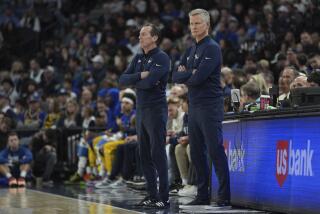Holmquist Cherishes the Ride to Milestone
Something about those late nights, driving back from road games in distant gymnasiums, his team squeezed into a van, makes Dave Holmquist smile. An honest-to-goodness smile. Followed by what could almost pass for a chuckle.
His reaction is noteworthy because a) he is not the type of coach who shows much emotion and b) traveling by van is supposed to be the lousy part of small-time college basketball.
Holmquist talks about the camaraderie of those moments. The longer the trip -- up the coast, say, or across the Arizona desert -- the more chance for players to open up.
âYou learn about each other,â he said. âThere are a lot of good memories.â
Memories that stretch across a quarter-century of coaching at Biola University, a Christian school tucked away in the suburbs southeast of Los Angeles. Memories that suit a man who, beyond Xs and Oâs, possesses a handful of masterâs degrees in subjects ranging from history to philosophy to theology.
And what about the other part of his job, the wins and losses?
Mention to Holmquist that he ranks among the winningest coaches in the nation. Ask him about the game at California Baptist a week ago, his 700th victory at the relatively young age of 54.
No hint of laughter. The reply is brief.
âI havenât thought much about it,â he said.
Biola plays in the National Assn. of Intercollegiate Athletics, an amalgam of small schools at the fringes of the larger, swankier NCAA.
The NAIA has no billion-dollar television contract, no glitzy arenas, so the media paid little attention to Holmquistâs landmark victory. It didnât help that the Eagles have struggled this winter, lacking size and consistency, amassing a 14-7 record considered so-so by their standards.
Holmquist has reacted with characteristic poise. During a recent loss to Point Loma Nazarene, he showed moments of fire, urging harder play, even thumping his chest. Mostly, though, he spent timeouts calmly instructing players on defensive switches, reminding them to box out for rebounds.
Losing is nothing new, he says. When Fresno Pacific College gave him his first head-coaching job in the mid-1970s -- he was 24, newly graduated from Biola -- the team began with 10 consecutive losses.
But it took only a few years to get things turned around, and, in 1978, his alma mater brought him back as co-coach. A few seasons later, Biola made the NAIA championship game, losing to South Carolina Spartanburg, and embarked on a string of 20- and 30-win seasons that would span, with few exceptions, the next two decades.
The 1990s brought milestone victories -- No. 400, No. 500 -- Holmquist now running the team on his own. In 2002, he won his 600th game at age 50, his program known for smart play and defense.
âA lot of defense,â said Joe Peron, who played for Biola in the mid-1980s and now coaches the womenâs team at Pasadena City College.
âIf he wants you to front the post, it doesnât matter how you do it, running or sliding, as long as you get there. You could say he has a passion for what he does.â
No coach wins 700 games, at any level, without badly wanting to succeed. Holmquistâs fervor shows in deep-set eyes, an unruly tuft of reddish hair atop his head. But this intensity is framed by meticulous dress -- polo shirt, khaki slacks, tasseled loafers -- and a voice that players sometimes tease about.
âHeâs got this real slow, monotone way of speaking, thereâs nothing exciting about it,â Peron said. âIf you didnât know him, youâd think, man, this guy is really boring.â
Said Holmquist: âSome coaches yell a lot and some donât.â
His style raises an obvious comparison, says Biola assistant Don Johnson, who played for UCLA and who says that Holmquist is cast from the same mold as John Wooden, âboth highly intelligent, highly principled.â
From one season to the next, former assistant Scott Mossman says, âI never heard [Holmquist] say itâs important that we win tonight, weâve got to win, like a lot of coaches do.â
âIt was more about relating to kids and letting them know he cares,â said Mossman, the coach at Grand Canyon in Phoenix. âA much higher calling than just winning games.â
This approach draws upon another of Holmquistâs passions -- education. With no wife or kids, he has devoted his free time to attending classes at various Southern California universities and accumulating those post-graduate degrees to accompany a coachâs requisite doctorate in physical education.
Sitting in an office of bare white walls, with plaques and team photos stacked unceremoniously in a corner, he easily if not eagerly switches from talking about interior defense to a discussion of Hegel and the nature of nation-states.
âHe cares a lot about life,â said Paul Guerrero, a senior guard on this seasonâs team. âHe knows there are a lot of other important things.â
Players say they can turn to him at any time, for anything, be it problems with finances, family or girlfriends. They describe a man who will listen patiently to every word, then respond with a saying or bit of wisdom.
The advice might be something gleaned from his philosophy studies, or while earning a degree in marriage, family and child counseling. Maybe his eagerness to help players in their personal lives has helped to build a winning program.
âIn our conference, itâs a coachesâ conference,â said Bill Odell, the coach at rival Azusa Pacific. âYouâll find teams that overachieve because of what the coaches give to the players.â
At Biola, it is hard to argue with the results, Holmquist amassing a 700-243 record for a .742 winning percentage. Success has brought interest from larger schools such as Pepperdine and Pacific, but he has remained content to stay.
âYou get kids who are Christians, who want to be here for reasons other than basketball,â Holmquist said. âYou get to coach people you like.â
Victories and defeats become secondary -- Holmquist seems prouder about having stood as best man at the weddings of several former players -- and the fact that Biola has come close to a national championship, but never quite won, is hardly critical.
âSome people have as their goal in life to be happy; I think those people rarely end up happy,â he said. âWhereas I think that if people pursue character and the right things in life, happiness kind of sneaks up on them.â
Take the other night, victory No. 700, for example. Holmquist marked the occasion in characteristic fashion.
âI celebrated with my guys,â he said.
That meant getting his players back in the van for the drive home from Riverside. Along the way, they stopped at a burger stand off the 91 Freeway for a late-night snack, a few minutes to sit around and talk.
More to Read
Go beyond the scoreboard
Get the latest on L.A.'s teams in the daily Sports Report newsletter.
You may occasionally receive promotional content from the Los Angeles Times.











